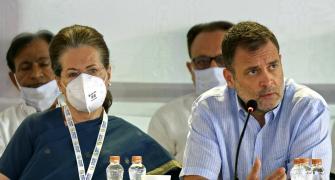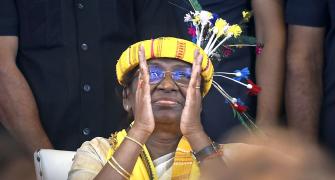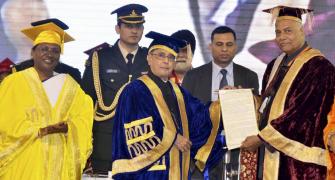Joint opposition candidate for the August 6 vice presidential election Margaret Alva, a Congress veteran, is not new to comebacks.

Barring a brief lull in 2008 triggered by her standoff with Congress president Sonia Gandhi over the issue of family entitlement in ticket distribution, the suave and soft-spoken Alva's career has largely been a dream run.
Alva, 80, has a political career spanning over four decades during which she occupied several positions including a five-time Congress MP, a union minister and then governor.
Her selection as the VP candidate comes ahead the 2023 Karnataka elections and signals the Opposition's urge to field a candidate described by All India Congress Committee general secretary communication Jairam Ramesh as 'representative of a diverse country'.
Alva had publicly alleged the 'sale of Congress tickets in Karnataka' in 2008 when her son Nivedith's ticket claim was shot down by the then party in charge of the state.
Alva had then openly questioned the denial of ticket to her son while wards of leaders in some other states had been accommodated.
She was dropped at the time as AICC general secretary and also from the party's election committee but made a comeback later and retired as governor of Rajasthan in 2014.
While she was always close to Sonia, her son Nikhil Alva also served in Rahul Gandhi's closest team of advisors when the latter was Congress president until his resignation after the party's May 2019 embarrassing loss.
She was elected to the Rajya Sabha for the first time in 1974 at the age of 32 years and remained in the upper house for four terms until 1998. She won her first Lok Sabha election from Karnataka and served as a member of the 13th Lok Sabha.
Alva was made minister of state for parliamentary affairs by then prime minister Rajiv Gandhi in 1984 when she was just 42.
Through her three decades in Parliament as MP and later minister, Alva piloted major legislative amendments on women's rights, reservation for women in local bodies, equal remuneration, marriage laws and Dowry Prohibition Amendment Act.
Her first political setback came in 2004 when she lost the Lok Sabha election and was appointed adviser to the Bureau of Parliamentary Studies and Training, a body established to improve the levels of the legislative function of Parliament and state legislatures.
Alva was also made AICC general secretary in charge of crucial states Maharashtra, Punjab and Haryana.
She also went on to become the first woman governor of Uttarakhand besides serving as governor of Goa, Gujarat and Rajasthan.
A little-known fact about Alva is that she was encouraged to enter politics by her father-in-law Joachim Alva and mother-in-law Violet Alva.
Violet Alva and Joachim Alva both made it to Rajya Sabha and Lok Sabha respectively in 1952 from then Bombay State, making them the first couple to be elected together to Parliament.
Margaret had married their son Niranjan in 1964 and went on to eventually join politics under the guidance of the then Karnataka chief minister Devaraj Urs, a close confidant of Indira Gandhi at the time.
Margaret Alva personally hails from a humble family of Mangalore where she was born a Catholic to P A Nazareth and Elizabeth who died when Alva was very young.
She did not let adversity get the better of her and went on to complete her BA and later a law degree.
Alva also practised as a lawyer briefly but destiny willed otherwise.
She has three sons and a daughter.








